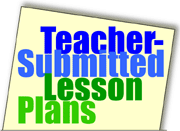|
Spelling Clue Race


Subjects
Grades
Brief Description
The Spelling Clue Race improves spelling retention, encourages
logical thinking and teamwork, and motivates students to spell correctly.
Objectives
Students will
- apply higher order thinking skills to decode a clue.
- correctly spell the words that are part of the race.
Keywords
Spelling, review, game
Materials Needed
Note: Materials will vary depending on the topic being studied.
In the sample lesson below, students are studying Mercury, Venus,
and Earth, and the materials reflect that.
- prepared clues for a selection of spelling words (see sample clues in The Lesson description)
- paper and pencils/pens
Lesson Plan
This game makes for a fun review activity a day or two before the weekly spelling test. The teacher is actively involved in preparing and participating in the game.
Before the Lesson
In advance the activity, prepare clues for five to seven of the week's spelling words. Write the clues on pieces of paper, one clue per piece of paper. (You might want to be sure to write clues for the most challenging or most frequently misspelled words on the list.) The clues can be as easy or difficult as you wish, depending on the age or grade level of your students.
The Activity
Arrange students into small teams; teams of three to five work best. Give the teams 3 to 5 minutes to review the spelling words. When time is up, they must put their spelling lists away.
Have each team choose a runner and a recorder. The runner will "run" to the teacher's desk to get a clue that his or her team will use to determine the spelling word. The recorder will write the spelling word -- spelling counts!
For a variation on the game, you might have all students write the words; all members of the team need to correctly spell the words in order to win the race.
When the teams are set, have each runner go to the teacher's desk to receive the first clue. Share one clue at a time. Students do not pick up the paper the clue is written on; they look at the clue and then return to their groups with the information provided. Clues can be presented in word form, picture form, or a combination of the two.
Sample clues:
- Clue: A synonym for this word might be a lot or many.
(The word is plethora.)
- Clue: This word has two s's, two l's, and two e's -- and is
often spelled incorrectly. (The word is misspelled.)
- Clue: [This clue is written in visual form. It shows an empty
box with an arrow pointing inside + a picture of a vest + a
picture of a gate. Students put the clues together to form the
spelling word.] (The clues "in" + vest + a gate give away the
spelling word, which is investigate.)
- Clue: The letters in the words he eats it can be rearranged
to spell this word. (The word is hesitate.) [Note: You
can use the Internet
Anagram Server to create anagrams of your own.]
The runner does not have to figure out the word that is informed by the clue; he or she simply takes the clue back to the group. Once the group figures out the clue, the recorder boldly writes the spelling word on a sheet of scrap paper and holds up the paper for the teacher to see. The teacher nods if the word is correctly spelled. Then the runner "runs" to get the second clue. And so on The first team to correctly identify all the words is the winning team.
Alternate Rules
The game can be played following the above rules except that the recorder does not show the words until the end of the game. When the team has identified all the words from the clues, all members of the team stand by their desks. The runner takes the recorder's sheet to the teacher. If the words are correctly identified and spelled, that team is the winner. If not, the runner returns to his or her team and the team members try to figure out what is wrong. The first team to correctly identify and spell all the words wins.
Notes
- After you have played the game a few times, you might have students
make up clues as a homework assignment; and then use the students'
clues in the next game.
- You might provide a prize -- a piece of candy, bonus points,
homework passes, a bookmark, extra reading time, for example --
for the winning team.
- You might not play the Spelling Clue Race every week. That will
keep students motivated and interested.
- For advanced learners, you might use multiple step clues or
harder clues.
Assessment
This activity provides one more source of practice for difficult
words on the weekly spelling list. Students will score 90 percent
or better on their end-of-week spelling test.
Submitted By
Miriam F. Arvinger, Guilford Middle School in Greensboro, North
Carolina
Originally published 05/29/2003
Last updated 01/05/2009



To help us keep our Lesson Plan Database as current as possible,
please e-mail
us to report any links that are not working.
|